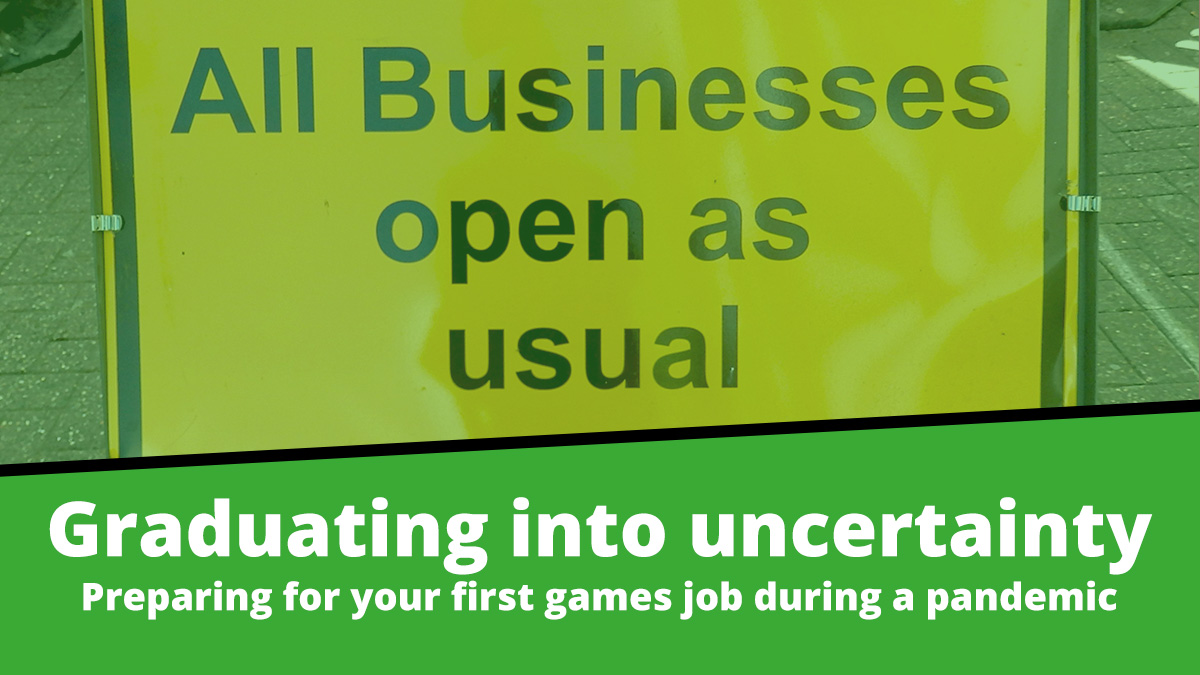Graduating into uncertainty; preparing for your first games job during a pandemic.

With many students now graduating into a job market no one had anticipated, we get some insight from Andy Driver, Operations Manager for Grads In Games, on finding and preparing for games industry jobs during the current COVID-19 situation. Andy has worked across the recruitment sector for several years, and leads our graduate recruitment team here.
We are a short period into the greatest economic and social disruption most of us have ever experienced. We don’t know how long this disruption will last, only that we are almost certainly in the early rather than the late stages. The effects of COVID-19 are being felt by everybody and students are realising they it may be likely they will be graduating into a global recession.
A quick google search uncovers countless horror stories of final year students, eager to take the first steps of their career, whose hard fought job offers have now been retracted. Or those with scheduled job interviews, finding them cancelled with no set date to be rearranged. Routes into graduate jobs have also been affected, with the Institute of Student Employers (ISE) suggested that internships and placements will be reduced by almost a third this year. However, it is still too early to tell to what extent COVID-19 will impact the graduate job market, but what we do know, is that some industries will be affected more than others.
What about the games industry?
The Washington Post suggests that the video game industry is thriving, observing impressive jumps in revenue compared to other industries. The explanation for this is pretty straightforward, more people are at home with little to do, there is no live sport and no commuting time for those who are working. So we know sales are up but how does that actually impact the studios developing the games you love?
“We noticed in March, when the effects of the virus were relatively unknown, enquiries to the website had dropped and candidate numbers were slipping, so we started speaking to our studio partners to find out if they were recruiting or how they were pivoting their systems.” Says Jamie Clarke, General Sales Manager of the leading games job board GamesJobsDirect.
He continues; “Since the end of March we have seen numbers to our website reach record highs and the number of jobs on the website has also been at a record high. The initial worry that people had was replaced with an enthusiasm to go on as they normally would, but in a slightly different way.”
This is certainly positive news and the initial outlook on how this affects graduate recruitment in the games industry looked equally as positive when explored by Grads in Games in March. Since that time the graduate recruitment team at Aardvark Swift have not seen a reduction in activity throughout April and May, with interview and placement numbers remaining high. Although this has not been without some adjustments made by studios.
What should you expect as a graduate applying for roles in the games industry?
Well firstly, some understanding of the wider situation is necessary. Getting a graduate job in the games industry is hugely competitive and challenging in regular times, you can now add to that any teething problems studios may be having as they adjust to a full work-from-home model which can result in recruitment processes becoming disjointed and slower than usual. This will be frustrating, however patience will be needed. Once out of lockdown, these issues will not disappear, rather they will evolve in to new challenges, such as how do we social distance in the workplace? These are challenges that are unprecedented, therefore they may take time to figure out.
One thing that is certain, is that if you secure an interview, it will almost definitely be done remotely. Studios have adapted well to this, many of them adopting technology like Zoom or Microsoft Teams to carry out interviews they usually would in their office. If you haven’t done a video interview before, there are a few basics you should remember:
Make sure you are in a quiet place, free from distractions for you and the interviewer
- Test your webcam and mic ahead of time
- Make sure you have a tidy and clean background (nobody wants to see a messy bedroom)
- Dress professionally (No suit needed, but make sure you are wearing something smart-casual and appropriate, at least on your top half!)
- Take notes! Have a pen and paper ready.
If you are lucky enough to work your way through an interview process and secure an offer, there are a few other things you should probably be aware of;
You may be asked if you can start remotely
For some studios, they are able to onboard and get people started working remotely straight away. This may seem great but think carefully before agreeing, while you may have had a space to carry out a video interview or do a tech test, do you have an adequate space where you can work uninterrupted for 8 hours a day every day. If the only space is in the kitchen of a busy house, this may not be suitable, so think carefully before accepting.
Your start date may be delayed
Not all studios will be able to onboard people remotely, especially not graduates who will need significantly more mentorship than senior employees. This means that you may secure a job offer with a start date that is delayed until it is expected the studio will be able to bring staff back to the office. This may be a couple of months further away than you originally planned for but it does not mean your job offer is not secure, you will still have commitment from the studio.
You may be offered an initial fixed-term contract rather than a permanent role
Due to the uncertainty of the current climate as well as the increased risk when hiring somebody inexperienced into a remote position, this may be an option for some studios. It may mean you are able to start sooner on a remote role but you may not be eligible for the full list of benefits a studio offers.
What about getting yourself out there and noticed?
With COVID-19 putting an end to any careers fairs and networking events, it is now even more essential than ever that as a student you are able to build an online brand and presence. While it is not necessarily the only important thing, networking effectively online will help you get a job.
Treat your portfolio as your shop window, whether you are an artist, programmer or designer, this is where you want to be able to show what you can do. This means regular updates showcasing new skills you have learnt, presenting the very best work you can do in an easy to digest manner and with clear descriptions of exactly what you have built. For specific advice on building a portfolio as a programmer and an artist check out our tutorials on YouTube here and here.
Alongside your portfolio build your presence on platforms that you know people who recruit people in the games industry are on, most notabley LinkedIn and Twitter. Ensure you have a full up-to-date profile and connect with people working at companies you want to work in. Engage with the posts of these people by liking and commenting and don’t be afraid to share updates of your own, it may be a screenshot of a work in progress or finished piece, showcase your work to the people that you want to see it.
By continuing to learn and develop your portfolio, alongside building your brand and networking with the people that you want to work with, you are increasing your chances of securing a job every day. As always, if you want further portfolio advice, information on graduate jobs in the games industry or advice on how to structure your CV specifically for the games industry then the team here at Grads in Games is always here to offer assistance.
To speak with Andy or our graduate recruitment team about anything covered in this article, you can get in touch by emailing careers@gradsingames.com
